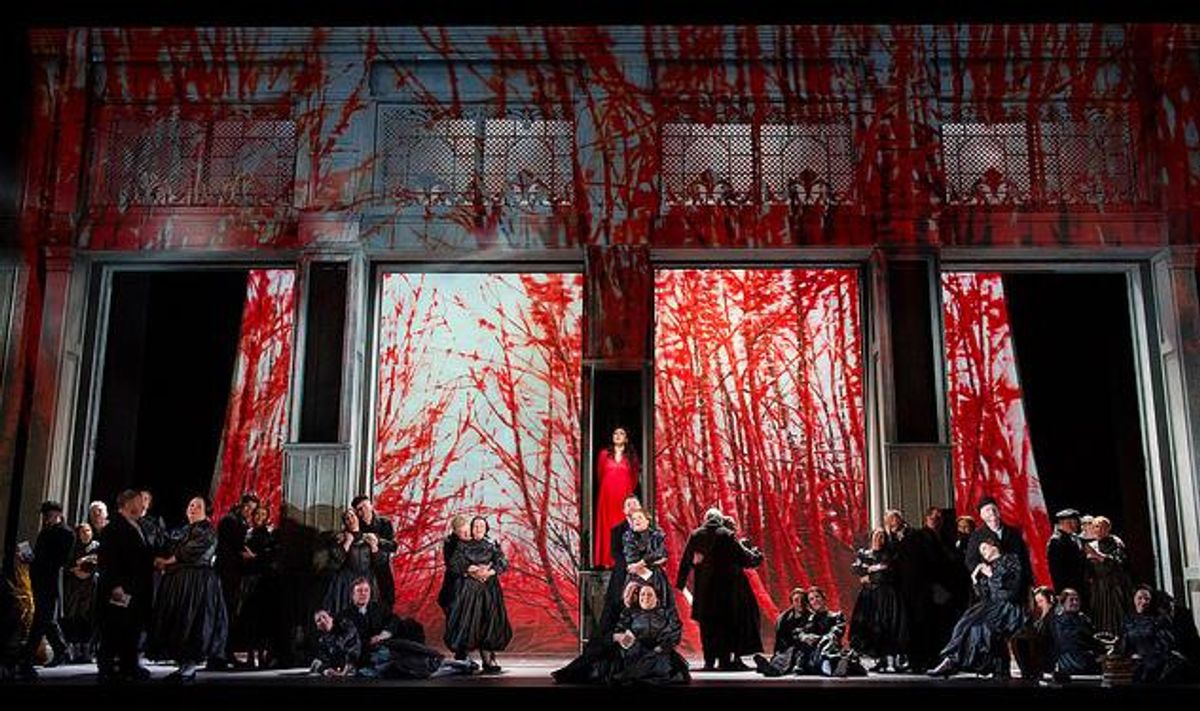
The Met claims its 'artistic mission' precludes political action. Yeah, right.
August 29 2013 10:22 AM EST
February 05 2015 9:27 PM EST
By continuing to use our site, you agree to our Private Policy and Terms of Use.

Konstantin Altunin painting "Travesty"
The Metropolitan Opera really has no excuse now. The famed house will open its fall season next month with Eugene Onegin, an opera by Pyotr Tchaikovsky, the Russian composer the Russian government is trying to turn straight for an upcoming biopic.
LGBT activists want the Met should show its opposition to Russia's anti-gay regime by dedicating their 9/23 opening night to equality, especially since the evening's conductor, Valery Gergiev, and leading soprano, Anna Netrebko, both have supported Russian President Vladimir Putin. (Netrebko has not commented directly on the situation in her home country, but has issued a statement expressing her personal feelings on discrimination toward LGBT people. "As an artist, it is my great joy to collaborate with all my wonderful colleagues--regardless of their race, ethnicity, religion, gender, or sexual orientation. I have never and will never discriminate against anyone," she said.)
There's also a change.org petition calling for a queer dedication, and prominent lesbian Rabbi Sharon Kleinbaum wrote a New York Times op-ed that read, "What better way for the Met to make a statement about its support of gay human rights than at a night featuring the work of Tchaikovsky, whose life was destroyed out of shame and despair as a closeted gay man?" Dedicating opening night to inclusion would help nullify Russian hate and prove that the Met takes human rights seriously, they say. The Met, however, disagrees. General Manager Peter Geld insists the opera is neither the time nor the place for sexual politicking. "Since our mission is artistic, it is not appropriate for our performances to be used by us for political purposes, no matter how noble or right the cause," Geld said in the Met's official statement.
By this logic, the political and artistic have nothing to do with one another. Of course, reality tells a different story. Art reacts to politics (see: Picasso's "Guernica," a reaction to German aggression against Spain) and politics reacts to art, (see: Cincinnati's ban of Robert Mapplethorpe or Maine Gov. Paul LePage's hysteria-driven, Tea Party-approved removal of pro-union murals from his state's Department of Labor building).* And Russia's anti-gay crusade has definitely broken into the art world: Police yesterday raided a St. Petersburg art gallery to confiscate "Travesty," a Konstantin Altunin painting that depicts Putin and Prime Minister Dmitry Medvedev in drag (pictured). Altunin has now fled Russia, fearing for his life. And, in another artistic realm, the musicians from Pussy Riot remain incarcerated for their anti-Putin and pro-LGBT "propaganda."
Russia's anti-gay edicts and its crackdown on artistic expression are intrinsically linked. Regimes like Russia's try to control art to control their population, to monopolize discourse. Geld and the Met can deny this all they want, but the writing is on the wall, and the Met has a responsibility to stand not only with LGBT people, but with artists everywhere.
*And of course there's the propagandist synergy between governments and artists, something the USSR mastered.
Sexy MAGA: Viral post saying Republicans 'have two daddies now' gets a rise from the right